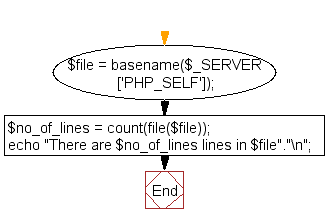PHP Exercises : Count number of lines in a file
PHP : Exercise-16 with Solution
Write a PHP script to count number of lines in a file.
Note : Store a text file name into a variable and count the number of lines of text it has.
Sample Solution: -
PHP Code:
<?php
$file = basename($_SERVER['PHP_SELF']);
$no_of_lines = count(file($file));
echo "There are $no_of_lines lines in $file"."\n";
?>
Sample Output:
There are 5 lines in a6924e70-5a4c-11e7-b47b-99347412a245.php
Flowchart:

basename() function: The basename(path,suffix) function is used to get the filename from a path.
count() function: The count() function is used to count the elements of an array or the properties of an object.
Note: For objects, if you have SPL installed, you can hook into count() by implementing interface Countable. The interface has exactly one method, Countable::count(), which returns the return value for the count() function.
PHP Code Editor:
Have another way to solve this solution? Contribute your code (and comments) through Disqus.
Previous: Write a PHP script to get last modified information of a file.
Next: Write a PHP script to print current PHP version.
What is the difficulty level of this exercise?
Test your Programming skills with w3resource's quiz.
PHP: Tips of the Day
How to Sort Multi-dimensional Array by Value?
Try a usort, If you are still on PHP 5.2 or earlier, you'll have to define a sorting function first:
Example:
function sortByOrder($a, $b) {
return $a['order'] - $b['order'];
}
usort($myArray, 'sortByOrder');
Starting in PHP 5.3, you can use an anonymous function:
usort($myArray, function($a, $b) {
return $a['order'] - $b['order'];
});
And finally with PHP 7 you can use the spaceship operator:
usort($myArray, function($a, $b) {
return $a['order'] <=> $b['order'];
});
To extend this to multi-dimensional sorting, reference the second/third sorting elements if the first is zero - best explained below. You can also use this for sorting on sub-elements.
usort($myArray, function($a, $b) {
$retval = $a['order'] <=> $b['order'];
if ($retval == 0) {
$retval = $a['suborder'] <=> $b['suborder'];
if ($retval == 0) {
$retval = $a['details']['subsuborder'] <=> $b['details']['subsuborder'];
}
}
return $retval;
});
If you need to retain key associations, use uasort() - see comparison of array sorting functions in the manual
Ref : https://bit.ly/3i77vCC
- New Content published on w3resource:
- HTML-CSS Practical: Exercises, Practice, Solution
- Java Regular Expression: Exercises, Practice, Solution
- Scala Programming Exercises, Practice, Solution
- Python Itertools exercises
- Python Numpy exercises
- Python GeoPy Package exercises
- Python Pandas exercises
- Python nltk exercises
- Python BeautifulSoup exercises
- Form Template
- Composer - PHP Package Manager
- PHPUnit - PHP Testing
- Laravel - PHP Framework
- Angular - JavaScript Framework
- Vue - JavaScript Framework
- Jest - JavaScript Testing Framework
